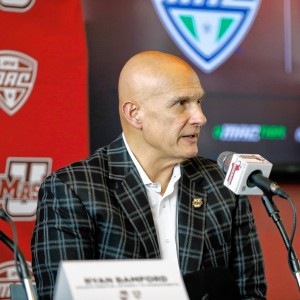Legal saga at Szawlowski potato farm in Hatfield nears end

Carl Szawlowski drives the Harvester and fills trucks with potatoes in Hatfield in July 2018. GAZETTE FILE PHOTO
| Published: 04-04-2024 4:05 PM |
NORTHAMPTON — A lawsuit brought by the owners of the largest potato farm in New England against a family member has ended after 4½ years with the judge upholding many of the plaintiffs’ complaints but ordering no damages.
Following a four-day Hampshire Superior Court trial in a civil case brought by the Szawlowski Companies against Joseph Szawlowski, Judge Kenneth W. Salinger ruled that the defendant had breached his fiduciary duty to the companies in several ways while he was employed by them, but that the “plaintiffs shall take nothing on their claims in this action.”
George Price, a Boston attorney representing the companies, said that although the judge ordered no damages, the decision completely vindicated the plaintiffs.
“We’re ecstatic about the verdict,” he said Wednesday. “The issue is, the defendant breached his fiduciary duty.”
But Joseph Szawlowski’s attorney, James Martin of Springfield, said he saw the decision as a supportive outcome, with the “vast majority” of the judge’s questions decided in Joseph’s favor.
Some of the others Martin termed “legal interpretations ... that we strongly disagree with,” and he said his client was weighing his options for an appeal.
The five Hatfield companies — Szawlowski Potato Farms Inc., C&F Farms Inc., Szawlowski Realty Inc., J&S Farms Inc. and Szawlowski Packers LLC — filed suit against Joseph Szawlowski in September 2019, accusing him of self-dealing, theft and misuse of company property and personnel, and waste of corporate assets.
Joseph is the son of Stanley Szawlowski, one of three surviving owners of the companies until his death in 2020. Brothers Chester and Frank Szawlowski are now the owners of record, while the daily running of the business is in the hands of Frank’s three daughters, along with other family members.
Article continues after...
Yesterday's Most Read Articles
 More than 130 arrested at pro-Palestinian protest at UMass
More than 130 arrested at pro-Palestinian protest at UMass
 Public gets a look at progress on Northampton Resilience Hub
Public gets a look at progress on Northampton Resilience Hub
 Northampton bans auto dealerships near downtown; zone change won’t affect Volvo operation on King Street
Northampton bans auto dealerships near downtown; zone change won’t affect Volvo operation on King Street
 UMass basketball: Bryant forward Daniel Rivera to be Minutemen’s first transfer of the offseason
UMass basketball: Bryant forward Daniel Rivera to be Minutemen’s first transfer of the offseason
 Town manager’s plan shorts Amherst Regional Schools’ budget
Town manager’s plan shorts Amherst Regional Schools’ budget
 Police respond to alcohol-fueled incidents in Amherst
Police respond to alcohol-fueled incidents in Amherst
Joseph previously sued the companies, his uncles and four of his cousins for breach of contract and breach of fiduciary duty. Salinger dismissed those claims last year. He also ruled against Joseph in three lawsuits he brought against the attorneys and legal firms who represented the Szawlowski Companies and the individual defendants, and ordered him to pay them $70,000 in attorneys’ fees.
The companies, colloquially known as Swaz, had hired Joseph as a forklift operator in 2011, and promoted him to packing house manager, a senior executive position, in 2014, according to the court complaint.
The companies accused Joseph of numerous breaches of his fiduciary duties, included selling stolen potatoes for cash that he pocketed, misappropriating farm labor, property and equipment for his own gain, and buying excessive amounts of unnecessary supplies.
The companies said such actions had caused them damages to be determined at trial, and that Joseph should forfeit all compensation he improperly obtained through breaching his fiduciary duty.
Salinger stated in his order that the parties had agreed to settle the case by a non-jury trial, with the court’s decision resting on the judge’s answers to a series of special questions.
Through these questions, Salinger found that Joseph breached his fiduciary duties to the companies from at least mid-2016 to late 2018 in numerous ways:
■ By taking potatoes, selling them and pocketing the proceeds, and by failing to prevent others from doing so.
■By repacking trucks belonging to third parties on company property, using company labor, and pocketing the proceeds.
■By covertly using the companies’ computer systems to access and monitor financial records and view privileged communications.
■ By refusing to sign and abide by a December 2016 policy regarding the sale of potatoes by family members, and by encouraging others to do the same.
The judge decreed that the companies’ legal action was not retaliatory, nor was it an effort to deprive Joseph of his rightful share of the business.
But he determined that Joseph’s compensation during that time did not exceed the value of the services he provided to the companies, so he should not forfeit any of that pay.
Martin said that was a victory for the defendant.
“(The plaintiffs) were seeking to recover hundreds of thousands of dollars,” he said.
But he disputed some of the judge’s findings, saying roughly half a dozen witnesses had testified on Joseph’s behalf that he never misappropriated farm products, while the plaintiffs’ witnesses had no personal knowledge of him doing so.
He said Joseph also maintained that his use of the companies’ computer system was permitted because he held his father’s power of attorney.
For now, the ruling settles one of the Szawlowski Companies’ legal entanglements. There remains a case in Probate Court brought by Frank and Chester Szawlowski challenging Joseph Szawlowski’s appointment as representative of his father’s estate.
Martin said the case has been languishing in Probate Court for years despite both sides’ efforts to move it along.
Price said he expected that Salinger’s latest ruling would be enough to settle the case in the plaintiffs’ favor.
“We’ll certainly make the Probate Court aware of this judgment,” he said.
James Pentland can be reached at jpentland@gazettenet.com.

 State Senate budget funds free community college for all
State Senate budget funds free community college for all ‘We can just be who we are’: Thousands show support for LGBTQ community at Hampshire Pride
‘We can just be who we are’: Thousands show support for LGBTQ community at Hampshire Pride Doors open at Tilton Library’s temporary home at South Deerfield Congregational Church
Doors open at Tilton Library’s temporary home at South Deerfield Congregational Church Area property deed transfers, May 2
Area property deed transfers, May 2
